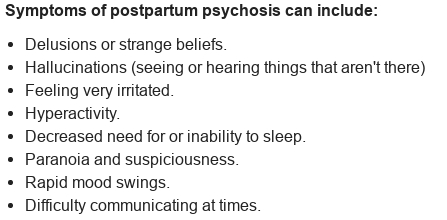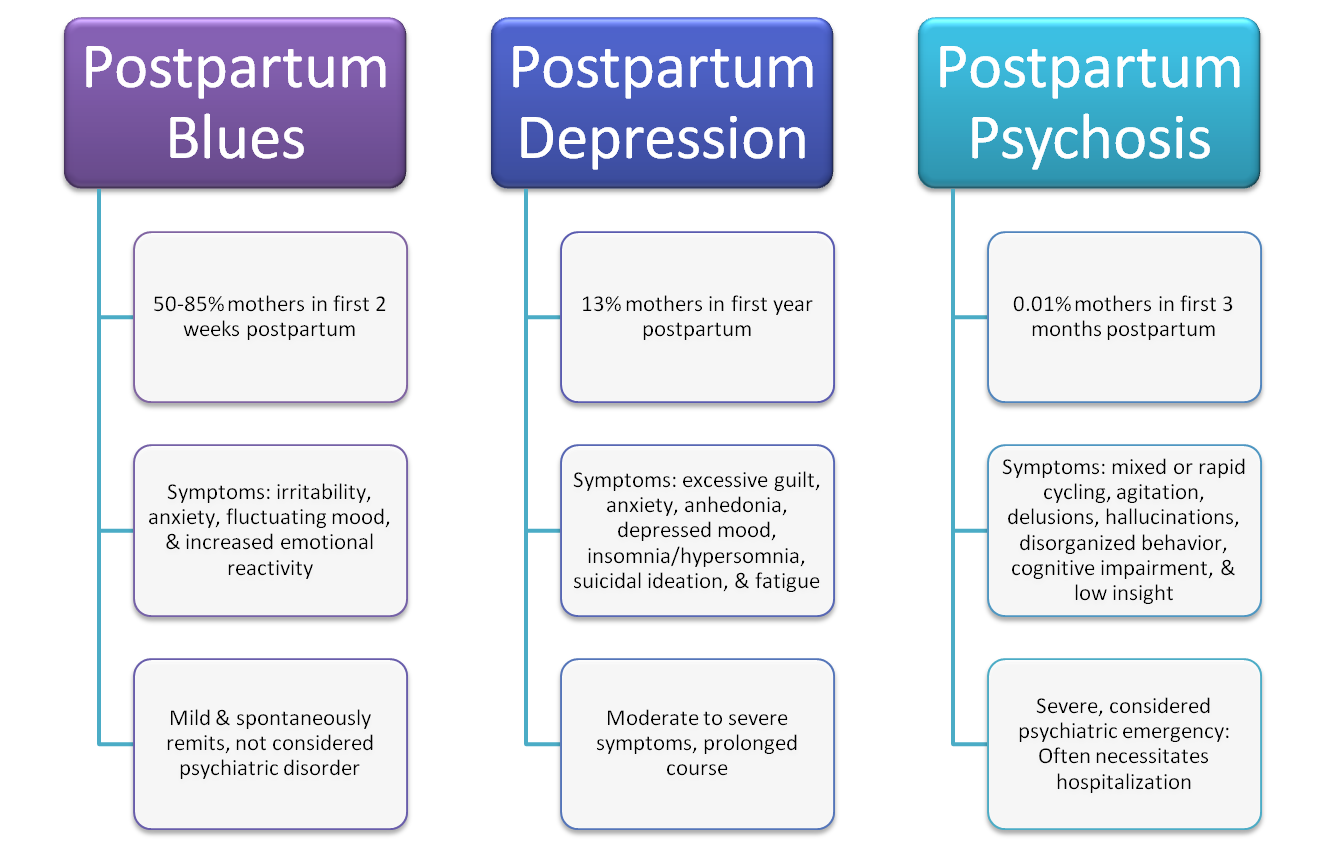Story
Postpartum psychosis is a severe mental illness that can affect a woman after she has a baby. In women who have stillborn babies the illness can be far worse as it is combined with PTSD causing untold mental torture. It causes the mother to have hallucinations and delusional thinking (symptoms of psychosis). It can happen to any woman. It often occurs ‘out of the blue’ to women who have not been ill before. It can be a frightening experience for women, their partners, friends and family.
If not treated immediately, it can get worse rapidly. The illness could cause her to neglect or harm her baby or harm herself. She may not realise she is ill, and it may be up to her partner, family or friends to spot the warning signs and take action.

Contact your GP immediately if you think someone you know may have developed postnatal psychosis. If this isn't possible, call NHS 111 or your local out-of-hours service. If you think there's a danger of imminent harm, call 999 and ask for an ambulance.
Many women experience mild mood changes after having a baby. It is common to feel many different emotions.
Over half of new mothers will have the 'Baby Blues'. This usually starts 3 to 4 days after birth. You may have mood swings. You may burst into tears easily. You can feel irritable, low and anxious at times. You may also over-react to things. It usually stops by the time your baby is about 10 days old. You don’t need treatment for Baby Blues.
Postnatal depression affects 10 to 15 in every 100 women after childbirth. The symptoms are similar to those in depression at other times. These include low mood and other symptoms lasting at least two weeks.
Postpartum psychosis is thought to affect only around one in every 1,000 women who give birth that equates to 0.01% of women who fall pregnant.. It's sometimes referred to as puerperal psychosis or postnatal psychosis. Postpartum psychosis is different from postnatal depression. It is a more severe illness. There are many different ways the illness can start. Women often have symptoms of depression or mania or a mixture of these. Symptoms can change very quickly from hour to hour and from one day to the next.

Once a woman develops postpartum psychosis, there's a high chance she will have another episode following future pregnancies.
For many women with postpartum psychosis there may be no warning. For other women it is clear that they have a high risk. If you have ever had a diagnosis of bipolar disorder or schizoaffective disorder, your risk of postpartum psychosis is high. You may also be in this high risk group if you have had a diagnosis of schizophrenia or another psychotic illness.
If you also have a mother or sister who has had postpartum psychosis, your risk may be even higher. Women who have had postpartum psychosis before are also at very high risk. If you are in one of these high risk groups your chance of having postpartum psychosis is between 1 in 4 and 1 in 2 (25% to 50%). You should discuss your individual risk with a psychiatrist.
You may be worried about your risk if a close relative has had postpartum psychosis. If your mother or sister had postpartum psychosis but you have not had any mental illness, your risk is around 3 in 100 (3%). This is higher than the risk in the general population. It is still much lower than for the very high risk groups.
If you already have a care plan because you've been assessed to be at high risk, there should be an emergency number you can call to reach a crisis team. If you don't have a care plan, and think you're having a psychotic episode, see your GP urgently or go to A&E.
Ideally let your psychiatrist and GP know that you want to get pregnant before you start trying for a baby. You can discuss with them any medications you are taking. They can advise you what you can do to ensure you are as well as possible before becoming pregnant. Many pregnancies are not planned. In that case, let people know as soon as possible.
If you are pregnant it is important to tell everyone involved in your care about your previous illness. This includes your midwife, obstetrician, GP and health visitor. Your mental health team and GP need to know you are pregnant. They all need to know you have a high risk of postpartum psychosis to make sure you get the care you need. They should help you to make a plan for your care.
Paying attention to other factors known to increase the risk of becoming ill may be important. These could include trying to reduce other stressful things going on in your life. Try to get as much sleep and rest as you can in late pregnancy and after the birth. With a new baby this may difficult. Ask your partner or family to take on some of the night time feeds if possible. Think about any factors which usually trigger your episodes of illness. Try to do whatever you can to reduce the chance of these happening.
For women taking medication to help keep them well, the decision to continue or stop medication in pregnancy is very difficult. There are no right and wrong answers. There are risks involved with all possible options. The options you can consider include:
continuing on all or some of your current medication
switching to other options which may be safer in pregnancy
coming off all medications.
It is important to discuss these with your psychiatrist. This will help you decide what is best for you and your baby.
Some women at high risk of postpartum psychosis may decide to start medication in late pregnancy or after delivery. This may reduce the risk of becoming ill. There is not enough research evidence to be sure about this. A number of medications are sometimes used in this way. These include antipsychotics and lithium. You should discuss this with your psychiatrist.
No one is really sure what causes postpartum psychosis. Fluctuations in hormones and sleep patterns could play a role, and there does seem to be a genetic basis, as a woman is more likely to develop the illness if her close relative had it. There seems to be link between postpartum psychosis and bipolar disorder. It's important to understand that postpartum psychosis is not caused by anything the woman did, nor is it caused by stress, relationship problems or a baby being unwanted.
It can take 6 -12 months or more to recover from postpartum psychosis. The most severe symptoms tend to last 2 to12 weeks. The vast majority of women will recover fully but may have further episodes of illness at a later time.
There is little to none support for fathers and families during a mother having an episode of postpartum psychosis, and if your partner has postpartum psychosis, it can be very distressing for you. At first you may be frightened or shocked. It is important that you ask for help when your partner first has symptoms. This is particularly important if she does not recognise that she is ill. If your partner is hospitalised with the baby, you may feel very alone and isolated. You may feel frustrated that there is little you can do to help. It is important that you seek help too from family members, if you feel you need it. It is important that your life is as stable as possible. Take time for yourself and prepare for when mum and baby return home.
It can be difficult living with someone recovering from postpartum psychosis. Ensure you remain healthy by exercising, eating well and getting enough rest.
Ask to speak to the Perinatal Psychiatrist or the other staff involved in your partner’s care if you have any concerns or questions. They are usually very supportive.
Be patient. It takes time for women to recover from an episode of postpartum psychosis.
In the long term being willing to talk about your experiences may aid recovery. Counselling or couple therapy may be helpful for some couples.